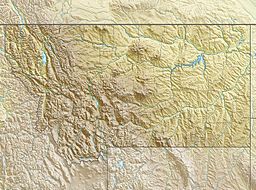Little Snowy Mountains facts for kids
Quick facts for kids Little Snowy Mountains |
|
|---|---|
| Highest point | |
| Elevation | 6,240 ft (1,900 m) |
| Dimensions | |
| Length | 16 mi (26 km) E-W |
| Width | 6 mi (9.7 km) N-S |
| Geography | |
| Country | United States |
| State | Montana |
| Range coordinates | 46°47′N 108°59′W / 46.783°N 108.983°W Location of Bold Butte near the center of the range |
The Little Snowy Mountains are a small mountain range located in central Montana. They are about 25 miles (40 km) southeast of the city of Lewistown. Most of these mountains are in Fergus County. However, the southern parts reach into Golden Valley and Musselshell counties.
These mountains are like a smaller extension of the Big Snowy Mountains, which are right next to them on the west side. To the east, about 12 miles (19 km) away, you'll find the small Pike Creek Hills.
A mountain pass connects the Big and Little Snowy Mountains. This pass is 6,018 feet (1,834 m) high, and Red Hill Road crosses it. The pass is much lower than the highest peaks of the Big Snowy range. But it's only about 200 feet (61 m) lower than the highest points in the Little Snowy Range. Bold Butte is a notable high spot near the middle of the range, standing at 5,624 feet (1,714 m) tall.
The South Fork Flatwillow Creek starts near Red Hill on the north side of the pass. It then flows east along the north side of the Little Snowy Mountains. Willow Creek and other smaller streams drain most of the southern part of the range. These waters eventually flow into the Musselshell River to the southeast.
What the Mountains Are Made Of
The Little Snowy Mountains are a continuation of a large rock structure called the Big Snowy Anticlinorium. This means they are made entirely of sedimentary rock. Sedimentary rocks are formed from layers of sand, mud, and other materials that build up over time.
Types of Rocks You Can Find
Near the Big Snowy Mountains, the ground is made of limestone and mudstone from the Mississippian Period. This was a long time ago, about 359 to 323 million years ago.
The main part of the Little Snowy Mountains has limestone from the Pennsylvanian Period. This rock is part of something called the Alaska Bench Formation. You can also find Jurassic Piper Formation rocks along the north side. These include mudstone, limestone, and gypsum.
On the south side of the mountains, the layers of rock often tilt steeply downwards. These rocks are from the Jurassic and Cretaceous periods. You can see an outcrop of Lower Cretaceous Kootenay Formation rocks on Sahara Hill. This is due to a fold in the rock layers called an anticline. There are also several thin layers of Upper Cretaceous rocks along the southern edge of the range. These layers usually tilt steeply as well.
 | Kyle Baker |
 | Joseph Yoakum |
 | Laura Wheeler Waring |
 | Henry Ossawa Tanner |


